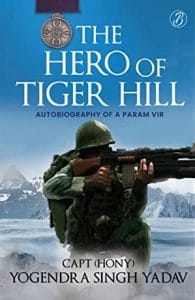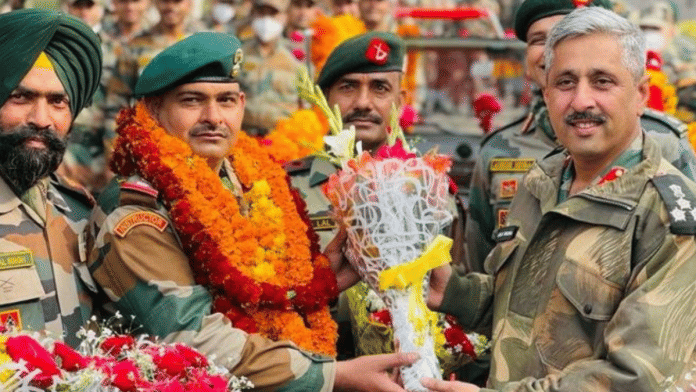It was a new life for me at the hospital. After spending sixteen months on the hospital bed, I was finally discharged. It was a long road to recovery and I spent months at the Base Hospital in Delhi, regaining my strength. In August that year, when the gallantry awards were announced, I was told that Yogendra Singh from our Unit was being awarded the Param Vir Chakra, posthumously. I was happy that my friend Yogendra had won the highest military honour of the country. Then the next day, I was formally communicated by the Chief of the Army Staff that it was I who was being honoured with the Param Vir Chakra. My happiness knew no bounds. It seemed like god’s kindness was showering all over me. There was also sort of miscommunication when I was unconscious for three days at the hospital in Srinagar. My family read in the papers that Yogenda Singh Yadav from 18 Grenadiers was one of the soldiers who laid his life in the line of duty. That was a terrible time for my family, especially my wife who had been in the family only for a couple of months. But thankfully, facts came to light and they realised that it was my namesake who we had lost. While the pain of losing a fellow remained, my family felt immense gratitude in knowing that I was recovering.
When I was discharged from the hospital, I went to my Unit. It was the start of a new era, a new life. I went to IMA, Dehradun. I met people there and discussed a lot of ideas with them. I was invited to many colleges and gatherings, but I realized that I could not speak on the stage on such occasions. I had never attended such programmes. For the first time, I was taken from the hospital to the village where I was supposed to address ten thousand people.
My hands were trembling as I held the mike because I had never seen such a large gathering before. I had never faced a crowd earlier. Then I felt that this was a shortcoming which I would have to overcome. Maybe this was because of lack of education. I decided to pursue education further.
At that time, I had passed the class ten examination. I passed my class twelve examination and then, did my graduation. After that, I started attending small programmes and events more confidently..
I remember, I could speak for twenty minutes in Agra. After that, I slowly lost my inhibitions. I gained enough self-confidence to face people and keep my point of view before them. This happened because now I had words through which I could describe my experiences, ideas and insights. Earlier, I did not have the power to express myself.
Also Read: For IAS exams, it’s important to know what not to study. Working like a donkey won’t help
I learned immensely by reading books and interacting with different people. My vocabulary improved and I tried using new words in my everyday conversations. In 2013, I took admission in B.Ed.
I continued going for programmes to schools and NGOs. After completing B.Ed. my life changed totally. While pursuing my Bachelor’s in Education from the Army Educational Corps Training College and Centre (AEC) in Panchmarhi in Madhya Pradesh, I had to help the teachers in making basic teaching charts, diagrams, lesson plans and took them to class to teach. I gained a lot of knowledge there and that boosted my
self confidence.
Then I went to IIT Kanpur to conduct my first big public speaking event. I got a very good response there. People appreciated my speech and asked me questions. I was greatly satisfied that I could share my life experiences and learnings with such polished minds.
I also went to IIM, Ahmedabad. Then, went to IIM, Indore where I was feeling a bit hesitant to speak in front of so many people. All of them were brilliant and wanted to gain an in-depth knowledge of everything. I listened to their questions and replied as best as I could. I always ensured that positivity oozed out of my thoughts, which is a clear reflection of how I do things in life.
When I had gone to IIT Kanpur for the first time, a girl asked me a question which I could answer after a lot of deliberaton. Army has always been a very transparent organisation and I answered the question, keeping that in mind. She asked, ‘Sir, if there is so much transparency, the person who runs the country, could run the army as well. Isn’t it?’ I understood her question and said, ‘You have asked the right question. You are talking about Dr APJ Abdul Kalam, isn’t it? He could not make it through the SSB10 examinations.’ All the students looked at me to listen to what I was going to say. I said, ‘This is the gift of our Army to the nation, which gave the country a missile man.’ She looked surprised and I said, ‘The Army does not only look at someone’s IQ, but several other factors before recruitment. Dr Kalam was exceptional in intelligence, but maybe there were other factors that led to this decision. Several key factors like performing under pressure, managing a team, carrying on with mental resilience for days and months make up for some factors. So while he was rejected by the army, that failure became a driving force for him to focus on something different and he became the missile man. Today he is the President of India.’
Also Read: George Fernandes fought for the unions, took on dictatorship but at the cost of his marriage
There were several such situations that gave me immense exposure. I was given a new perspective and talking to these brilliant students gave me a new way of thinking which enhanced my life.
After that, I went to two or three universities in South India and also to the IITs of Delhi and Mumbai. I tried to tell the story of my life in a better and more effective way. People listened to me and appreciated what I said.
The reason I am saying all this and the main reason behind writing this book is that you can be ordinary, but you can become a hero, if you have the right mindset to tackle difficult circumstances.
If we realize our shortcomings at the right time and start working on them, nothing is impossible. A sportsperson is nothing to start with, but with practice, he improves his skill and can even become a gold medallist one day.
The only condition is that a person must have the willpower to do something good. This can be done by listening to positive ideas. You should have the ability to listen to people attentively. You can have a good vocabulary only if you are fond of reading books. You will have a treasure trove of knowledge. When you have both words and powerful ideas, you will have no inhibition in putting across your views. You will be able to put across your views effectively and connect directly with your audience.
The communication can be impactful only when the audience can connect with you. I was in Junior Academy for eight years. While I was there, around fifty-six thousand students studied there. There too, my interpersonal skills improved. This was because I met them everywhere, talked to them, discussed things with them – all this helped me to enhance my skills. This was the beginning of a new chapter in my life.
Today, after retiring from the army, I have started on a new phase in life. I hope I can do something fruitful in this phase and contribute something meaningful to the society and my country.
 This excerpt from ‘The Hero of Tiger Hill’ by Capt. (Hony) Yogendra Singh Yadav has been published with permission from Srishti Publishers.
This excerpt from ‘The Hero of Tiger Hill’ by Capt. (Hony) Yogendra Singh Yadav has been published with permission from Srishti Publishers.






